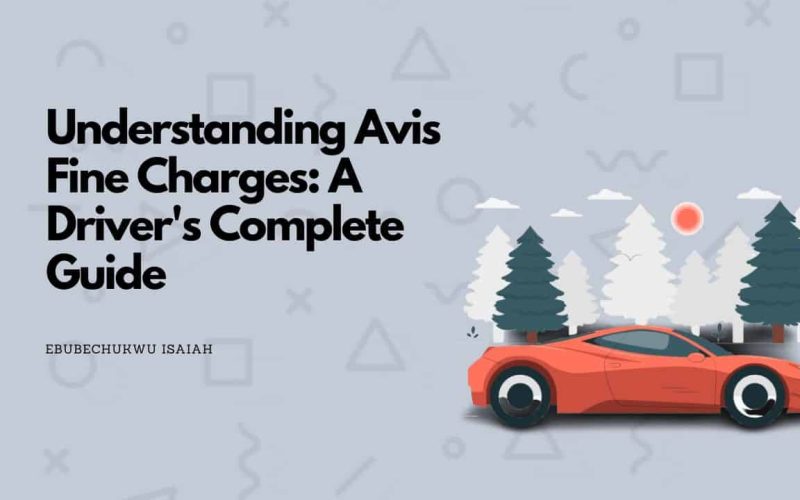I still remember the sinking feeling in my stomach when I opened that unexpected email from Avis a few weeks after returning my rental car.
A fine charge had been added to my credit card, and like many of you might be feeling right now, I was both confused and frustrated.
Whether you’re currently dealing with an Avis fine charge or want to protect yourself from future surprises, this comprehensive guide will walk you through everything you need to know.
The Anatomy of Avis Fine Charges
When it comes to rental car fines, not all charges are created equal. I’ve learned through both personal experience and extensive research that Avis typically issues fine charges for several specific reasons.
The most common include toll violations, parking tickets, speeding cameras, and late returns. What makes these charges particularly tricky is that they often appear weeks after your rental period has ended.
Here’s what typically happens: If you receive a traffic violation or toll charge during your rental period, the issuing authority sends the ticket to Avis.
The company then matches the violation to your rental agreement and charges your card for both the original fine amount and an administrative fee.
The administrative fee, which ranges from $30 to $75 depending on the violation type, is what catches most renters off guard.
Navigating the Fine Process
Have you ever wondered why rental companies can charge you without immediate notification?
The answer lies in the rental agreement’s fine print, which you signed before taking the keys.
This document gives Avis the legal right to charge your card for any violations incurred during your rental period.
I’ve found that the best defense against unexpected charges is a proactive approach:
- Document everything at pickup and drop-off with photos
- Keep all toll receipts and parking payments
- Set a reminder to return the vehicle on time
- Review your rental agreement’s specific fine policies
Understanding Your Rights and Responsibilities
Let’s talk about something that many drivers don’t realize: you have the right to dispute an Avis fine charge, but there’s a proper way to do it.
Through my experience helping others navigate this process, I’ve learned that successful disputes typically require three key elements:
- Clear documentation supporting your case
- Prompt action within 30 days of the charge
- Direct communication with both Avis and the issuing authority
If you believe a fine charge is incorrect, don’t wait to take action. Contact Avis’s customer service department immediately and request detailed information about the violation.
You’ll want to know the exact date, time, and location of the alleged incident.
Prevention: The Best Defense Against Fine Charges
Remember when I mentioned that sinking feeling upon receiving an unexpected charge?
You can avoid that entirely with some strategic planning. Here’s what I now do before every rental:
- Research toll systems along my planned route
- Pre-register for electronic toll payment programs
- Take time-stamped photos of the vehicle at pickup and return
- Review local parking and traffic regulations
The financial impact of rental car fines can be significant. Beyond the original violation amount, those administrative fees can add up quickly.
I’ve seen cases where a simple $2 unpaid toll ballooned into a $50 charge after administrative fees were added.
Real-World Solutions and Best Practices
You might be wondering: what’s the most effective way to handle toll roads during your rental period?
Based on my experience and conversations with frequent renters, I recommend opting for Avis’s toll pass program if you’ll be encountering multiple toll roads.
While it comes with a daily fee, it often proves cheaper than risking missed tolls and subsequent fines.
For parking, always err on the side of caution. Those extra few minutes on the meter might seem unnecessary, but they’re far less expensive than a parking ticket plus administrative fees.
I make it a habit to use parking apps whenever possible, as they provide clear payment records and automatic time extensions if needed.
Conclusion:
Managing Avis fine charges doesn’t have to be a source of stress or financial surprise. By understanding the system, maintaining proper documentation, and taking preventive measures, you can avoid most common fine situations.
If you do receive a charge, remember that you have rights and options for addressing it.
After dealing with my own fine charge and helping others through similar situations, I’ve learned that knowledge truly is power in this context.
Keep this guide handy the next time you rent from Avis, and you’ll be well-equipped to handle whatever comes your way.
Remember, the goal isn’t just to avoid fines – it’s to ensure a smooth, enjoyable rental experience from start to finish.
Have you encountered an Avis fine charge recently?
Start by gathering your rental documentation and following the steps outlined above. With the right approach, you can navigate this challenge effectively and protect yourself from future charges.






